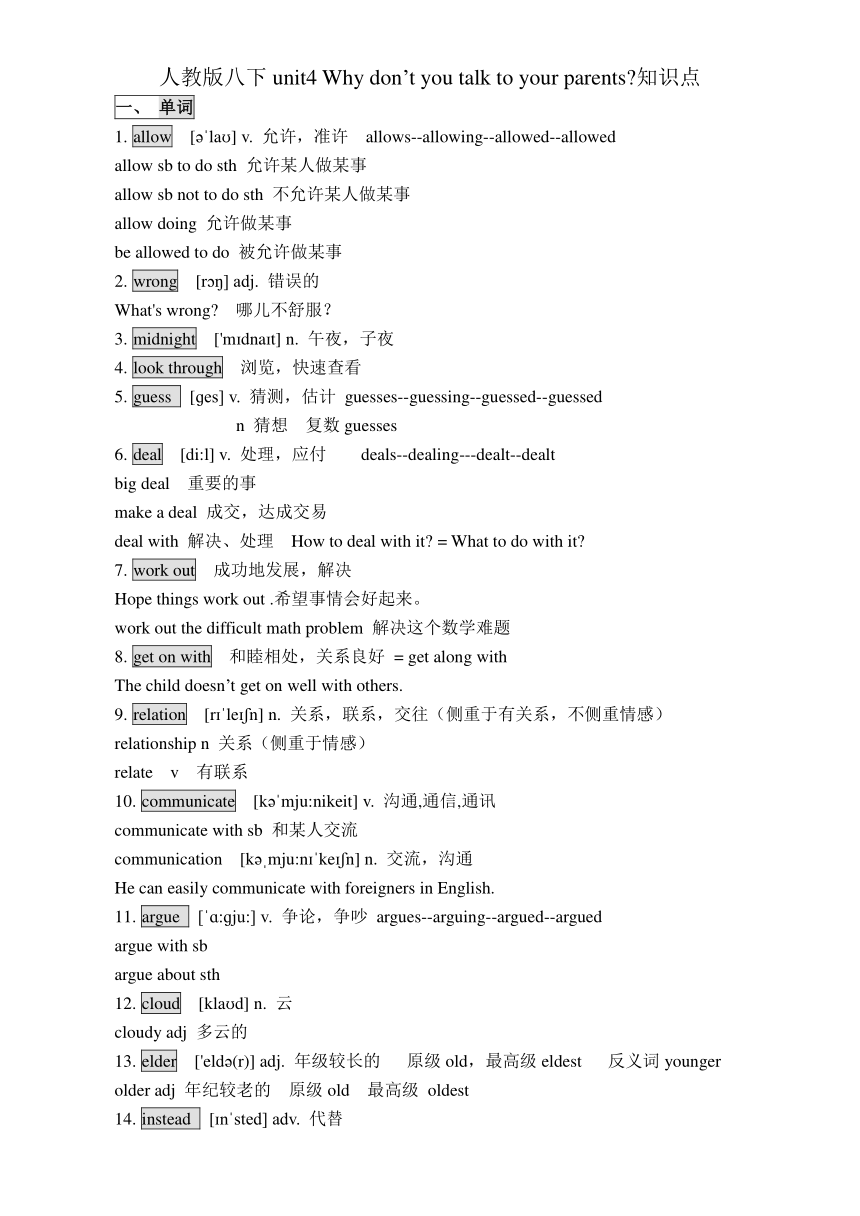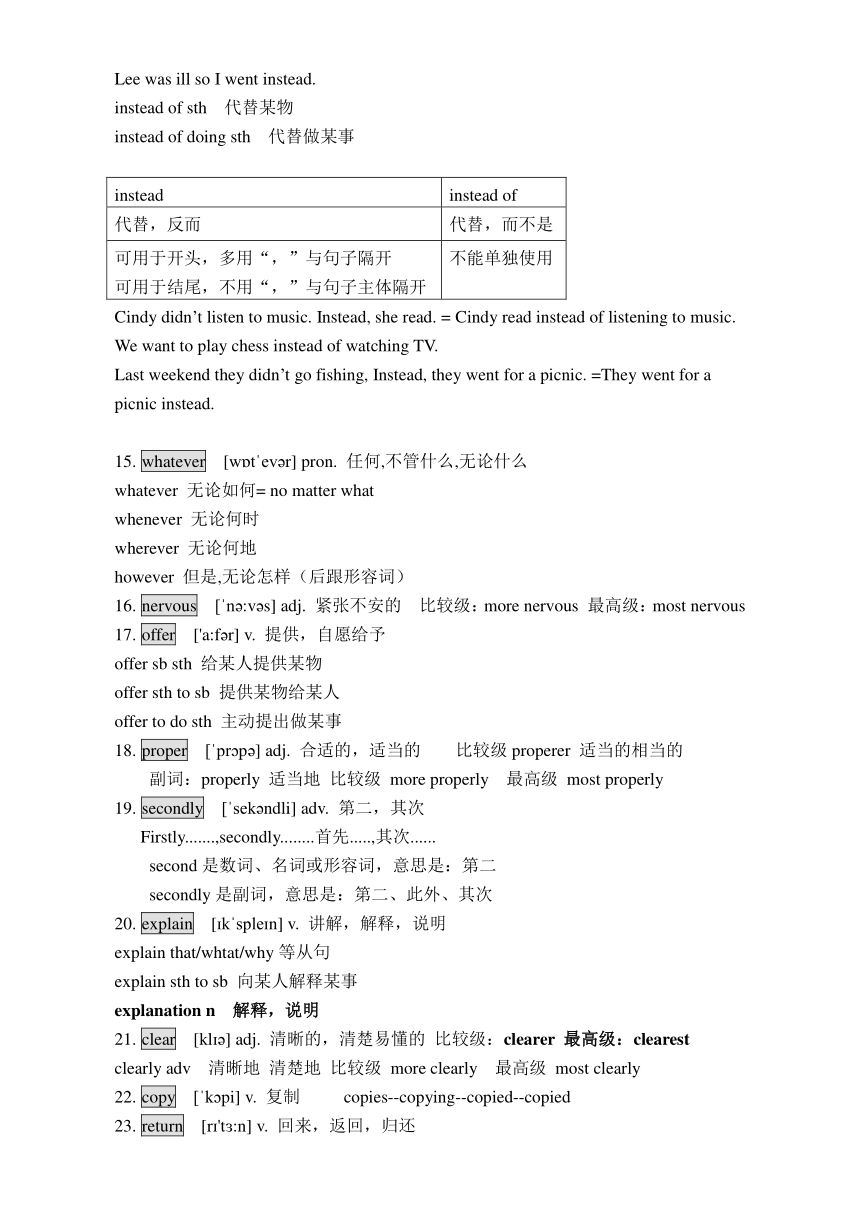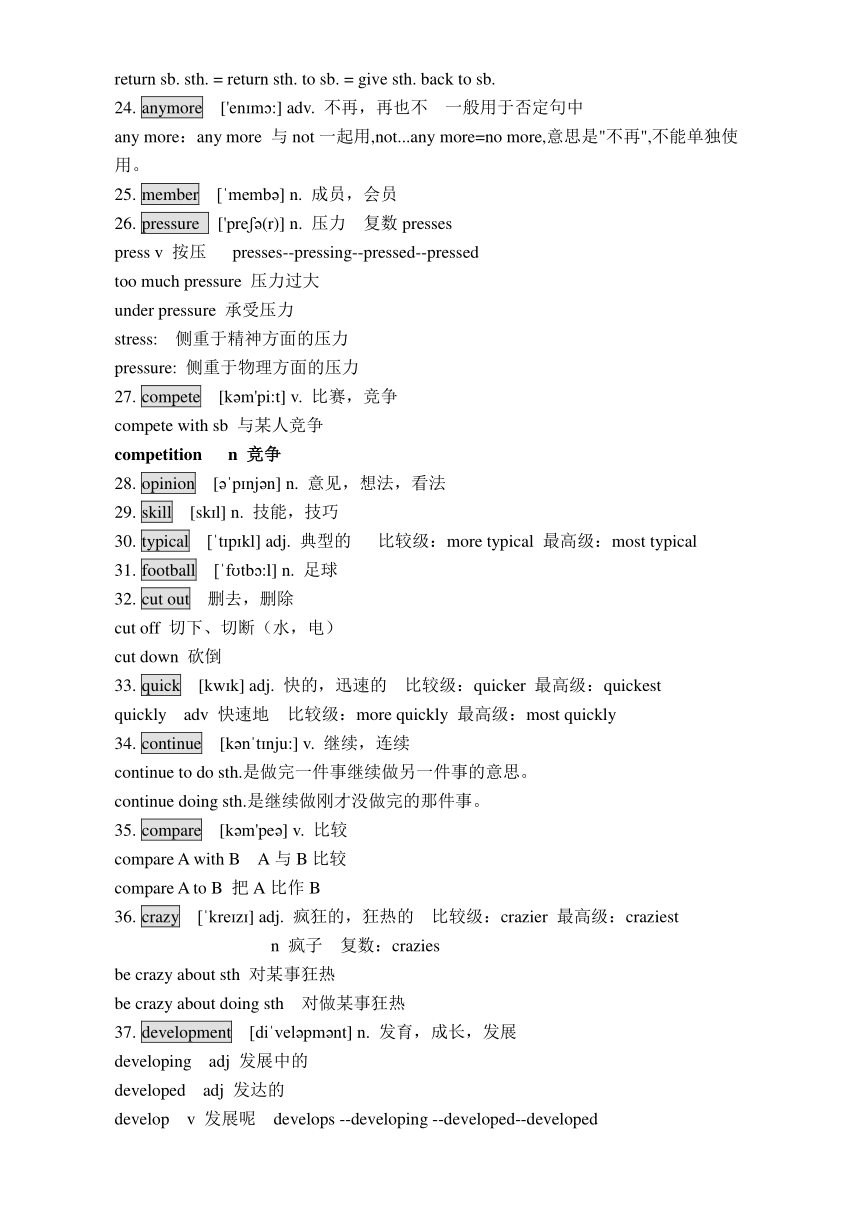Unit4 Why don't you talk to your parents知识点
文档属性
| 名称 | Unit4 Why don't you talk to your parents知识点 |

|
|
| 格式 | docx | ||
| 文件大小 | 29.7KB | ||
| 资源类型 | 教案 | ||
| 版本资源 | 人教新目标(Go for it)版 | ||
| 科目 | 英语 | ||
| 更新时间 | 2023-03-28 00:00:00 | ||
图片预览



文档简介
人教版八下unit4 Why don’t you talk to your parents 知识点
单词
allow [ la ] v. 允许,准许 allows--allowing--allowed--allowed
allow sb to do sth 允许某人做某事
allow sb not to do sth 不允许某人做某事
allow doing 允许做某事
be allowed to do 被允许做某事
wrong [r ] adj. 错误的
What's wrong 哪儿不舒服?
midnight ['m dna t] n. 午夜,子夜
look through 浏览,快速查看
guess [ɡes] v. 猜测,估计 guesses--guessing--guessed--guessed
n 猜想 复数guesses
deal [di:l] v. 处理,应付 deals--dealing---dealt--dealt
big deal 重要的事
make a deal 成交,达成交易
deal with 解决、处理 How to deal with it = What to do with it
work out 成功地发展,解决
Hope things work out .希望事情会好起来。
work out the difficult math problem 解决这个数学难题
get on with 和睦相处,关系良好 = get along with
The child doesn’t get on well with others.
relation [r le n] n. 关系,联系,交往(侧重于有关系,不侧重情感)
relationship n 关系(侧重于情感)
relate v 有联系
communicate [k mju:nikeit] v. 沟通,通信,通讯
communicate with sb 和某人交流
communication [k mju:n ke n] n. 交流,沟通
He can easily communicate with foreigners in English.
argue [ ɑ:ɡju:] v. 争论,争吵 argues--arguing--argued--argued
argue with sb
argue about sth
cloud [kla d] n. 云
cloudy adj 多云的
elder ['eld (r)] adj. 年级较长的 原级old,最高级eldest 反义词younger
older adj 年纪较老的 原级old 最高级 oldest
instead [ n sted] adv. 代替
Lee was ill so I went instead.
instead of sth 代替某物
instead of doing sth 代替做某事
instead instead of
代替,反而 代替,而不是
可用于开头,多用“,”与句子隔开 可用于结尾,不用“,”与句子主体隔开 不能单独使用
Cindy didn’t listen to music. Instead, she read. = Cindy read instead of listening to music.
We want to play chess instead of watching TV.
Last weekend they didn’t go fishing, Instead, they went for a picnic. =They went for a picnic instead.
whatever [w t ev r] pron. 任何,不管什么,无论什么
whatever 无论如何= no matter what
whenever 无论何时
wherever 无论何地
however 但是,无论怎样(后跟形容词)
nervous [ n :v s] adj. 紧张不安的 比较级:more nervous 最高级:most nervous
offer ['a:f r] v. 提供,自愿给予
offer sb sth 给某人提供某物
offer sth to sb 提供某物给某人
offer to do sth 主动提出做某事
proper [ pr p ] adj. 合适的,适当的 比较级properer 适当的相当的
副词:properly 适当地 比较级 more properly 最高级 most properly
secondly [ sek ndli] adv. 第二,其次
Firstly.......,secondly........首先.....,其次......
second是数词、名词或形容词,意思是:第二
secondly是副词,意思是:第二、此外、其次
explain [ k sple n] v. 讲解,解释,说明
explain that/whtat/why等从句
explain sth to sb 向某人解释某事
explanation n 解释,说明
clear [kl ] adj. 清晰的,清楚易懂的 比较级:clearer 最高级:clearest
clearly adv 清晰地 清楚地 比较级 more clearly 最高级 most clearly
copy [ k pi] v. 复制 copies--copying--copied--copied
return [r 't :n] v. 回来,返回,归还
return sb. sth. = return sth. to sb. = give sth. back to sb.
anymore ['en m :] adv. 不再,再也不 一般用于否定句中
any more:any more 与not一起用,not...any more=no more,意思是"不再",不能单独使用。
member [ memb ] n. 成员,会员
pressure ['pre (r)] n. 压力 复数presses
press v 按压 presses--pressing--pressed--pressed
too much pressure 压力过大
under pressure 承受压力
stress: 侧重于精神方面的压力
pressure: 侧重于物理方面的压力
compete [k m'pi:t] v. 比赛,竞争
compete with sb 与某人竞争
competition n 竞争
opinion [ p nj n] n. 意见,想法,看法
skill [sk l] n. 技能,技巧
typical [ t p kl] adj. 典型的 比较级:more typical 最高级:most typical
football [ f tb :l] n. 足球
cut out 删去,删除
cut off 切下、切断(水,电)
cut down 砍倒
quick [kw k] adj. 快的,迅速的 比较级:quicker 最高级:quickest
quickly adv 快速地 比较级:more quickly 最高级:most quickly
continue [k n t nju:] v. 继续,连续
continue to do sth.是做完一件事继续做另一件事的意思。
continue doing sth.是继续做刚才没做完的那件事。
compare [k m'pe ] v. 比较
compare A with B A与B比较
compare A to B 把A比作B
crazy [ kre z ] adj. 疯狂的,狂热的 比较级:crazier 最高级:craziest
n 疯子 复数:crazies
be crazy about sth 对某事狂热
be crazy about doing sth 对做某事狂热
development [di vel pm nt] n. 发育,成长,发展
developing adj 发展中的
developed adj 发达的
develop v 发展呢 develops --developing --developed--developed
cause [k :z] v. 引发,使发生
n 原因,起因 What caused him to change his mind
usual [ ju: u l] adj. 通常的,平常的
as usual 像平常一样
usually adv 通常地
in one's opinion 依… 看
perhaps [p h ps] adv. 可能,大概,也许
补充单词:
fight n 打仗 战斗
v 战斗 打架 fights--fighting--fought--fought
push v 推 反义词 拉pull
v 督促 push sb to do sth
push sb into doing sth
leave v 离开 留下
leave sth + 地点 把某物忘在某地
二、词组
study too much学得太多
get enough sleep得到充足的睡眠
have free time to do things I like有空余时间做我喜欢的事情
allow me to hang out with my friends允许我和朋友们闲逛
too many after-school classes太多课外班
get into/have a fight with my best friends和我最好的朋友吵架
study until midnight学到半夜
take him to the ball game带他去看球赛
surprise him 使他感到惊讶
talk about it on the phone在电话里谈论它
find my sister looking through my things/ find sb doing 发现我的姐姐正在翻看我的东西
give them back to you/return them to you 把它们还给你
Hope things work out希望一切进展顺利。
get on/along (well) with my family和我的家人和谐相处
relations between my parents我父母之间的关系
a big, black cloud hanging over our home悬挂在我们家上空的一大片乌云
refuse to let me watch my favorite TV show拒绝让我看我最喜欢的电视节目
offer to help 主动帮助
have time for proper communication有时间进行合适的交流
communicate with your brother和你的兄弟交流
mind him watching TV介意他看电视
explain sth to sb对某人解释某事
borrow my things without returning them借我的东西不还
return to Beijing回到北京
spend time alone独自消磨时光
give me a lot of pressure 给我很多压力
compete with my classmates和我的同学竞争
have a fight with sb 与某人打架
have for 为.....斗争
say sth to sb 跟某人说某事
be always doing sth 一直在做(表赞赏或抱怨)
the 姓氏s .....一家人
return to Beijing回到北京
spend time alone独自消磨时光
give me a lot of pressure 给我很多压力
compete with my classmates和我的同学竞争
learn exam skills学习考试技巧
get into a goof high school进入好的高中
a typical American family一个典型的美国家庭
cut out a few of their activities减少一些他们的活动
it’s time for homework该做作业的时间了
know all about such stress了解所有这一切的压力
Competition starts very young and continues until the kids get older竞争从很小的年纪就开始,一直持续到孩子们长大。
compare their kids with other kids把他们的孩子和其他孩子作比较
push their kids too hard逼孩子太紧
a child’s development一个孩子的发展
cause a lot of stress for children 给孩子们引发很多压力
in my opinion在我看来
三、语法
Although和Though:
adv “即使,虽然”,引导让步状语从句(属于状语从句中的一种,其本身也是状语从句。一般翻译为"尽管……"或"即使……"等,就是我们日常生活中用的"退一步说…"的感觉。)
although,though 不可与but连用,但可以与still和yet连用。
Although she is wrong, it’s not a big deal。
not...until... 直到....才....
① until 做连词引导时间状语从句。
② until后面的从句中不能用一般将来时,应该用一般现在时代替所谓的“主将从现”.
③ 主句肯定句时,谓语用延续性动词,强调动作或状态一直持续到从句的动作发生为止。意为“直到.....为止”。
He will be working until 5 o'clock.
④ 主句否定句时,谓语动词用非延续性动词,强调主句动作在从句的动作发生之后才开始。意为“直到.....才.....”。
Tom will not go out to play with his friends until he finishes his homework.
so that 与so....that.....的区别:
so that:“为了”, 引导目的状语从句,相当于“in order that”.从句中多含有can ,could,may,might等情态动词。
he studied hrd so that he passed the exam.
so...that....:“太....以至于.....”,引导结果状语从句。so后面跟adj或adv。
He was so scared that he couldn’t say a word.
allow与let的区别:
① allow指“允许”,表示“默许,听任,不加阻止”,allow sb to do sth允许某人做某事。
② Let指“让”,let sb do sth让某人做某事,语意较弱,多用于口语中,let不能用于被动语态。
5. offer与provide的辨析:
① offer意为“提供,供给,提议”,强调主动,自愿给予
offer sb sth=offer sth to sb表示“向某人提供某物”,对方可以接受,也可以不接受;offer to do sth提议去做某事。
例:He offered to lend me some books.他提出要借给我一些书。
I offered her a beautiful dress.我给了她一件漂亮的连衣裙。
② provide强调为应付意外、突发事件、紧急情况等做好充分准备而“提供,供给”,多数情况是免费的.
provide sb with sth和provide sth for sb,表示“为某人提供某物”。
例:We provide children with good education.我们为儿童提供良好的教育。
The shool provided food for the students.学校为学生们提供伙食。
6 be good at意为“擅长,善于”:
be good at doing = do well in ...
例:She is good at English.她英语学的好。
=She does well in English.
however意为“然而,尽管如此”
however为副词,在句中作插入语,起一个连词的作用,一般用逗号与句子分开,可以放在句首或句中。
例:It’s raining hard, However, I think we should go out.
雨下的很大。尽管如此,我认为我们还应该出去。
no longer与not any more的用法区别:
① no longer(= not....any more)常用来修饰延续性动词,表示“与过去相比不再........”
例:He no longer lives here.他不再住在这儿了。
② not....any more(=no more)常用来修饰非延续性动词,通常指今后“再也不”,表示不再重复发生以前发生的动作或存在的状态,强调终止,多用于将来时,但也可用于过去时。
例:I shall go there no more.我再也不到那儿去了。
【注意】
表示时间时用no longer,多放在系动词后或实义动词前,
强调数量或程度时用no more,放在系动词后或句末。
perhaps,probably,possibly,maybe:
① perhaps意为“也许,可能”,一般指比较小的可能性。
例:Perhaps I will see him the day after tomorrow,but I am not sure.
也许我后天去看他,不过我不能确定。
② probably意为“很可能,大概”,其可能性最大,表示一种几乎完全肯定的意思。
例:He will probably refuse the offer.
他很可能会拒绝这份提议。
③ possibly意为“可能,或许,也许”,可能性较大。
例:I’ll see you today, or possibly tomorrow.
我今天要见你,不过也可能是明天。
④ maybe意为“或许,大概”,主要用于非正式场合,常用在口语中,语气比perhaps轻。
例:Maybe you put the letter in your basket.
或许你把信放在你的篮子里了。
“It’s +adj+for sb+to do sth”与 “It’s +adj+of sb+to do sth”的区别:
① “It’s +adj+for sb+to do sth”不含有“Sb is+adj”的意思
例:It is not difficult for you to learn a foreign language if you spend time and energy on it.
如果你花时间和精力,学好一门外语并不难。
② “It’s +adj+of sb+to do sth”含有“Sb is+adj”的意思,形容词往往表示的是该逻辑主语的特征或性格,常用于这个句型的形容词有kind,good,nice,clever,foolish等。
例:It was wise of him to do that.
他那样做是明智的。
单词
allow [ la ] v. 允许,准许 allows--allowing--allowed--allowed
allow sb to do sth 允许某人做某事
allow sb not to do sth 不允许某人做某事
allow doing 允许做某事
be allowed to do 被允许做某事
wrong [r ] adj. 错误的
What's wrong 哪儿不舒服?
midnight ['m dna t] n. 午夜,子夜
look through 浏览,快速查看
guess [ɡes] v. 猜测,估计 guesses--guessing--guessed--guessed
n 猜想 复数guesses
deal [di:l] v. 处理,应付 deals--dealing---dealt--dealt
big deal 重要的事
make a deal 成交,达成交易
deal with 解决、处理 How to deal with it = What to do with it
work out 成功地发展,解决
Hope things work out .希望事情会好起来。
work out the difficult math problem 解决这个数学难题
get on with 和睦相处,关系良好 = get along with
The child doesn’t get on well with others.
relation [r le n] n. 关系,联系,交往(侧重于有关系,不侧重情感)
relationship n 关系(侧重于情感)
relate v 有联系
communicate [k mju:nikeit] v. 沟通,通信,通讯
communicate with sb 和某人交流
communication [k mju:n ke n] n. 交流,沟通
He can easily communicate with foreigners in English.
argue [ ɑ:ɡju:] v. 争论,争吵 argues--arguing--argued--argued
argue with sb
argue about sth
cloud [kla d] n. 云
cloudy adj 多云的
elder ['eld (r)] adj. 年级较长的 原级old,最高级eldest 反义词younger
older adj 年纪较老的 原级old 最高级 oldest
instead [ n sted] adv. 代替
Lee was ill so I went instead.
instead of sth 代替某物
instead of doing sth 代替做某事
instead instead of
代替,反而 代替,而不是
可用于开头,多用“,”与句子隔开 可用于结尾,不用“,”与句子主体隔开 不能单独使用
Cindy didn’t listen to music. Instead, she read. = Cindy read instead of listening to music.
We want to play chess instead of watching TV.
Last weekend they didn’t go fishing, Instead, they went for a picnic. =They went for a picnic instead.
whatever [w t ev r] pron. 任何,不管什么,无论什么
whatever 无论如何= no matter what
whenever 无论何时
wherever 无论何地
however 但是,无论怎样(后跟形容词)
nervous [ n :v s] adj. 紧张不安的 比较级:more nervous 最高级:most nervous
offer ['a:f r] v. 提供,自愿给予
offer sb sth 给某人提供某物
offer sth to sb 提供某物给某人
offer to do sth 主动提出做某事
proper [ pr p ] adj. 合适的,适当的 比较级properer 适当的相当的
副词:properly 适当地 比较级 more properly 最高级 most properly
secondly [ sek ndli] adv. 第二,其次
Firstly.......,secondly........首先.....,其次......
second是数词、名词或形容词,意思是:第二
secondly是副词,意思是:第二、此外、其次
explain [ k sple n] v. 讲解,解释,说明
explain that/whtat/why等从句
explain sth to sb 向某人解释某事
explanation n 解释,说明
clear [kl ] adj. 清晰的,清楚易懂的 比较级:clearer 最高级:clearest
clearly adv 清晰地 清楚地 比较级 more clearly 最高级 most clearly
copy [ k pi] v. 复制 copies--copying--copied--copied
return [r 't :n] v. 回来,返回,归还
return sb. sth. = return sth. to sb. = give sth. back to sb.
anymore ['en m :] adv. 不再,再也不 一般用于否定句中
any more:any more 与not一起用,not...any more=no more,意思是"不再",不能单独使用。
member [ memb ] n. 成员,会员
pressure ['pre (r)] n. 压力 复数presses
press v 按压 presses--pressing--pressed--pressed
too much pressure 压力过大
under pressure 承受压力
stress: 侧重于精神方面的压力
pressure: 侧重于物理方面的压力
compete [k m'pi:t] v. 比赛,竞争
compete with sb 与某人竞争
competition n 竞争
opinion [ p nj n] n. 意见,想法,看法
skill [sk l] n. 技能,技巧
typical [ t p kl] adj. 典型的 比较级:more typical 最高级:most typical
football [ f tb :l] n. 足球
cut out 删去,删除
cut off 切下、切断(水,电)
cut down 砍倒
quick [kw k] adj. 快的,迅速的 比较级:quicker 最高级:quickest
quickly adv 快速地 比较级:more quickly 最高级:most quickly
continue [k n t nju:] v. 继续,连续
continue to do sth.是做完一件事继续做另一件事的意思。
continue doing sth.是继续做刚才没做完的那件事。
compare [k m'pe ] v. 比较
compare A with B A与B比较
compare A to B 把A比作B
crazy [ kre z ] adj. 疯狂的,狂热的 比较级:crazier 最高级:craziest
n 疯子 复数:crazies
be crazy about sth 对某事狂热
be crazy about doing sth 对做某事狂热
development [di vel pm nt] n. 发育,成长,发展
developing adj 发展中的
developed adj 发达的
develop v 发展呢 develops --developing --developed--developed
cause [k :z] v. 引发,使发生
n 原因,起因 What caused him to change his mind
usual [ ju: u l] adj. 通常的,平常的
as usual 像平常一样
usually adv 通常地
in one's opinion 依… 看
perhaps [p h ps] adv. 可能,大概,也许
补充单词:
fight n 打仗 战斗
v 战斗 打架 fights--fighting--fought--fought
push v 推 反义词 拉pull
v 督促 push sb to do sth
push sb into doing sth
leave v 离开 留下
leave sth + 地点 把某物忘在某地
二、词组
study too much学得太多
get enough sleep得到充足的睡眠
have free time to do things I like有空余时间做我喜欢的事情
allow me to hang out with my friends允许我和朋友们闲逛
too many after-school classes太多课外班
get into/have a fight with my best friends和我最好的朋友吵架
study until midnight学到半夜
take him to the ball game带他去看球赛
surprise him 使他感到惊讶
talk about it on the phone在电话里谈论它
find my sister looking through my things/ find sb doing 发现我的姐姐正在翻看我的东西
give them back to you/return them to you 把它们还给你
Hope things work out希望一切进展顺利。
get on/along (well) with my family和我的家人和谐相处
relations between my parents我父母之间的关系
a big, black cloud hanging over our home悬挂在我们家上空的一大片乌云
refuse to let me watch my favorite TV show拒绝让我看我最喜欢的电视节目
offer to help 主动帮助
have time for proper communication有时间进行合适的交流
communicate with your brother和你的兄弟交流
mind him watching TV介意他看电视
explain sth to sb对某人解释某事
borrow my things without returning them借我的东西不还
return to Beijing回到北京
spend time alone独自消磨时光
give me a lot of pressure 给我很多压力
compete with my classmates和我的同学竞争
have a fight with sb 与某人打架
have for 为.....斗争
say sth to sb 跟某人说某事
be always doing sth 一直在做(表赞赏或抱怨)
the 姓氏s .....一家人
return to Beijing回到北京
spend time alone独自消磨时光
give me a lot of pressure 给我很多压力
compete with my classmates和我的同学竞争
learn exam skills学习考试技巧
get into a goof high school进入好的高中
a typical American family一个典型的美国家庭
cut out a few of their activities减少一些他们的活动
it’s time for homework该做作业的时间了
know all about such stress了解所有这一切的压力
Competition starts very young and continues until the kids get older竞争从很小的年纪就开始,一直持续到孩子们长大。
compare their kids with other kids把他们的孩子和其他孩子作比较
push their kids too hard逼孩子太紧
a child’s development一个孩子的发展
cause a lot of stress for children 给孩子们引发很多压力
in my opinion在我看来
三、语法
Although和Though:
adv “即使,虽然”,引导让步状语从句(属于状语从句中的一种,其本身也是状语从句。一般翻译为"尽管……"或"即使……"等,就是我们日常生活中用的"退一步说…"的感觉。)
although,though 不可与but连用,但可以与still和yet连用。
Although she is wrong, it’s not a big deal。
not...until... 直到....才....
① until 做连词引导时间状语从句。
② until后面的从句中不能用一般将来时,应该用一般现在时代替所谓的“主将从现”.
③ 主句肯定句时,谓语用延续性动词,强调动作或状态一直持续到从句的动作发生为止。意为“直到.....为止”。
He will be working until 5 o'clock.
④ 主句否定句时,谓语动词用非延续性动词,强调主句动作在从句的动作发生之后才开始。意为“直到.....才.....”。
Tom will not go out to play with his friends until he finishes his homework.
so that 与so....that.....的区别:
so that:“为了”, 引导目的状语从句,相当于“in order that”.从句中多含有can ,could,may,might等情态动词。
he studied hrd so that he passed the exam.
so...that....:“太....以至于.....”,引导结果状语从句。so后面跟adj或adv。
He was so scared that he couldn’t say a word.
allow与let的区别:
① allow指“允许”,表示“默许,听任,不加阻止”,allow sb to do sth允许某人做某事。
② Let指“让”,let sb do sth让某人做某事,语意较弱,多用于口语中,let不能用于被动语态。
5. offer与provide的辨析:
① offer意为“提供,供给,提议”,强调主动,自愿给予
offer sb sth=offer sth to sb表示“向某人提供某物”,对方可以接受,也可以不接受;offer to do sth提议去做某事。
例:He offered to lend me some books.他提出要借给我一些书。
I offered her a beautiful dress.我给了她一件漂亮的连衣裙。
② provide强调为应付意外、突发事件、紧急情况等做好充分准备而“提供,供给”,多数情况是免费的.
provide sb with sth和provide sth for sb,表示“为某人提供某物”。
例:We provide children with good education.我们为儿童提供良好的教育。
The shool provided food for the students.学校为学生们提供伙食。
6 be good at意为“擅长,善于”:
be good at doing = do well in ...
例:She is good at English.她英语学的好。
=She does well in English.
however意为“然而,尽管如此”
however为副词,在句中作插入语,起一个连词的作用,一般用逗号与句子分开,可以放在句首或句中。
例:It’s raining hard, However, I think we should go out.
雨下的很大。尽管如此,我认为我们还应该出去。
no longer与not any more的用法区别:
① no longer(= not....any more)常用来修饰延续性动词,表示“与过去相比不再........”
例:He no longer lives here.他不再住在这儿了。
② not....any more(=no more)常用来修饰非延续性动词,通常指今后“再也不”,表示不再重复发生以前发生的动作或存在的状态,强调终止,多用于将来时,但也可用于过去时。
例:I shall go there no more.我再也不到那儿去了。
【注意】
表示时间时用no longer,多放在系动词后或实义动词前,
强调数量或程度时用no more,放在系动词后或句末。
perhaps,probably,possibly,maybe:
① perhaps意为“也许,可能”,一般指比较小的可能性。
例:Perhaps I will see him the day after tomorrow,but I am not sure.
也许我后天去看他,不过我不能确定。
② probably意为“很可能,大概”,其可能性最大,表示一种几乎完全肯定的意思。
例:He will probably refuse the offer.
他很可能会拒绝这份提议。
③ possibly意为“可能,或许,也许”,可能性较大。
例:I’ll see you today, or possibly tomorrow.
我今天要见你,不过也可能是明天。
④ maybe意为“或许,大概”,主要用于非正式场合,常用在口语中,语气比perhaps轻。
例:Maybe you put the letter in your basket.
或许你把信放在你的篮子里了。
“It’s +adj+for sb+to do sth”与 “It’s +adj+of sb+to do sth”的区别:
① “It’s +adj+for sb+to do sth”不含有“Sb is+adj”的意思
例:It is not difficult for you to learn a foreign language if you spend time and energy on it.
如果你花时间和精力,学好一门外语并不难。
② “It’s +adj+of sb+to do sth”含有“Sb is+adj”的意思,形容词往往表示的是该逻辑主语的特征或性格,常用于这个句型的形容词有kind,good,nice,clever,foolish等。
例:It was wise of him to do that.
他那样做是明智的。
同课章节目录
- Unit 1 What's the matter?
- Section A
- Section B
- Unit 2 I'll help to clean up the city parks.
- Section A
- Section B
- Unit 3 Could you please clean your room?
- Section A
- Section B
- Unit 4 Why don't you talk to your parents?
- Section A
- Section B
- Unit 5 What were you doing when the rainstorm came
- Section A
- Section B
- Review of Units 1-5
- Unit 6 An old man tried to move the mountains.
- Section A
- Section B
- Unit 7 What's the highest mountain in the world?
- Section A
- Section B
- Unit 8 Have you read Treasure Island yet?
- Section A
- Section B
- Unit 9 Have you ever been to a museum?
- Section A
- Section B
- Unit 10 I've had this bike for three years.
- Section A
- Section B
